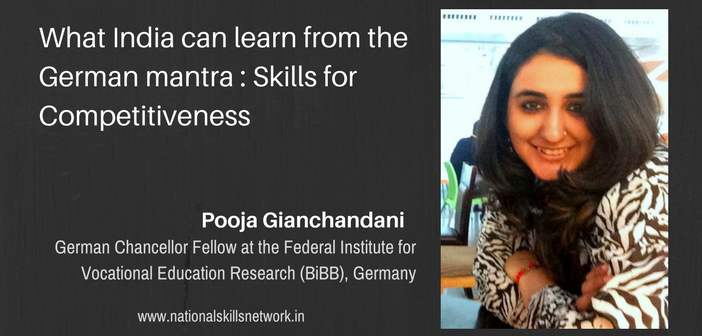In this editorial, our Guest Editor, Pooja Gianchandani, German Chancellor Fellow at the Federal Institute for Vocational Education Research (BIBB) provides an account of the rich vocational education tradition of Germany. She also introduces us to the authors who have contributed to the German Dual System Exclusive Edition of our newsletter ‘Skill Times from NSN’.
The foundations of the Indo-German partnership were laid in 1870 with the first 11000 KM telegraph line laid out by Siemens. Since then, Germany has been an important partner for India during its various stages of political and economic growth. It is the 7th largest foreign direct investor in India (FDI to the tune of USD 9.69 billion since 2000) and major German companies have sizeable operations in our country and contribute significantly towards job creation.
Recent initiatives such as the Make in India Mittelstand (MIIM) launched in September 2015 have started facilitating market entry of German Small & Medium Enterprises (till date 73 successful B2B partnerships established). In addition, renewed cooperation in Science & Technology, Energy Conservation, Urban Mobility, Entertainment, Culture and Development fields is helping both countries prepare for Industry 4.0. However, one area that remains a key interest and is discussed in all bilateral dialogues is Vocational Education & Training (VET) often interchangeably referred to as Skills Development in India. Over the years, through various bilateral formats German Institutions, such as the BMBF, BiBB, GOVET and iMove, have contributed immensely towards India’s national skills discourse regularly reminding us to align vocational skills to quality & competitiveness – a stark contrast to the short term, skills is for entry level approach.
From joint initiatives on in-company training, upgradation of ITIs, ATI, apprenticeship schemes etc. to the Training of Trainers (ToT) or exposure for early training providers on training methods; many invaluable inputs have been received through various knowledge fora. The German Dual System of Vocational Training has been referred to variously especially when India was discussing the National Skills Qualification Framework (NSQF) – An important contribution of the German side. Valuable inputs on structuring the Skills system, role of social partners such as Chambers of Commerce (similar to Sector Skills Councils), Trade Unions, National Skills Institutions (CISTARI, IGTR) and Private training providers helped us significantly.
 Whilst the creation of the Indian NSQF is the outcome of best practice sharing and knowledge support of many partner countries, the mantra ‘Vocational Education means Industry is in Driver’s seat’ is greatly inspired by the German Dual System of Training. The vision with which the Skilling India mission has been designed needs quality and competitiveness as the core. It requires a ‘Return on Investment’ approach where a value proposition has to be created for every contribution made in the skilling process – be it the Government’s strategic, institutional and financial role or the Companies offering long term apprenticeships or the Students making an initiative to chose a vocational qualification as a career path.
Whilst the creation of the Indian NSQF is the outcome of best practice sharing and knowledge support of many partner countries, the mantra ‘Vocational Education means Industry is in Driver’s seat’ is greatly inspired by the German Dual System of Training. The vision with which the Skilling India mission has been designed needs quality and competitiveness as the core. It requires a ‘Return on Investment’ approach where a value proposition has to be created for every contribution made in the skilling process – be it the Government’s strategic, institutional and financial role or the Companies offering long term apprenticeships or the Students making an initiative to chose a vocational qualification as a career path.
Much exciting as it sounds, research is not the priority when the country is chasing a huge skilling targets. Naturally, questions like – What drives the Industry (large and medium companies) to make this solid investment in Apprenticeships? How does the German system (Companies, Government, Social Partners and Individuals) review Cost-Benefit of VET investments? What are some lessons that can drive larger private sector and student participation ? What kind of adaptations are needed for a dual system to work within the framework of NSQF, especially with a large informal sector economy in India? – have lingered around for many years.
A few months into EduTech and a ring side view to Skilling India brought back some these questions and pushed me into a ‘Skills Quest’ of sorts. So when the Alexander Von Humboldt Foundation offered me a Research Scholarship in 2016 at the Federal Institute of Vocational Education Research (BiBB) as a Guest Scientist under the German Chancellor’s Fellow Programme, it was compelling enough to muck-in to find some of these answers. In the early days of my research, my questions on motivations and cost benefit of VET were welcomed, often with confused smiles, and some matter of fact responses like ‘it is the duty of the industry to invest in vocational education’, ‘we have been doing it since the industrial revolution’, ‘we have a large manufacturing sector and we need people who are trained and skilled’ etc etc.
To gain a balanced, non stereotypical view (eg Germany is all about Auto and Manufacturing) I picked Retail – sector we are well organised in and Construction – highly informal unstructured sector for my study. But as I digged deeper I realised that the famed dual system has been intricately designed to make VET a part of all social and economic mechanisms in Germany. For example: something as simple as the German law prescribing that the Parliament be composed such that elected member also represents ‘all recognised professions’ in the house. Therefore, it is not a surprise that VET is greatly valued and entry into Dual Studies and Apprenticeships is very competitive here.
Although, much has already been discussed about the Dual System and lot of literature is available online courtesy BiBB and its various entities like GOVET, iMove there are some areas which are of direct relevance to the aspirations of Skilling India. That we have much to gain from Germany on VET, has been reiterated time and again by the Hon Prime Minister Mr Modi, most recently in his meeting with the German Chancellor Ms. Merkel in May 2017. Therefore, the idea of this special issue was born. In this special issue we have invited senior experts from various Institutions to address the ideas around Skills Development with a more practical approach. Each one of them shares practical ideas on how Institutions can organise themselves, with or without the dual system of VET, citing examples from their own experiences.
 The newsletter begins with an interesting account on the models of the dual system from the context of constant evolution and its applicability in other economies by Dr. Philipp Grollmann who is Deputy Head of the Internationalisation / Monitoring of Vocational Education Systems at the BiBB. Dr Grollmann plays a vital role within BiBB to advise on the the Vocational Education systems, issues pertaining recruitment of skilled staff with EU and Germany.
The newsletter begins with an interesting account on the models of the dual system from the context of constant evolution and its applicability in other economies by Dr. Philipp Grollmann who is Deputy Head of the Internationalisation / Monitoring of Vocational Education Systems at the BiBB. Dr Grollmann plays a vital role within BiBB to advise on the the Vocational Education systems, issues pertaining recruitment of skilled staff with EU and Germany.
 Whereas the Chambers in India play a much wider and cross sectoral role, the Chambers in Germany also have a specialised role, much like the Sector Skills Councils, to act as the fulcrum of the Dual System of Vocational Education & Training. Besides ensuring that the Company, Apprentice and the Vocational School follow through the intricate legal and commercial arrangements, they ensure that the quality of the training and the certification is maintained across programmes. Mr. Jürgen Hindenberg, Director for Vocational Education and Training/Securing Skilled Personnel of the Chamber of Commerce and Industry Bonn/Rhein-Sieg (CCI). He presents an account of the role of the chambers highlighting the importance and sanctity attached to it.
Whereas the Chambers in India play a much wider and cross sectoral role, the Chambers in Germany also have a specialised role, much like the Sector Skills Councils, to act as the fulcrum of the Dual System of Vocational Education & Training. Besides ensuring that the Company, Apprentice and the Vocational School follow through the intricate legal and commercial arrangements, they ensure that the quality of the training and the certification is maintained across programmes. Mr. Jürgen Hindenberg, Director for Vocational Education and Training/Securing Skilled Personnel of the Chamber of Commerce and Industry Bonn/Rhein-Sieg (CCI). He presents an account of the role of the chambers highlighting the importance and sanctity attached to it.
 An important social partner which is often on the fringe in our Indian context but should be deeply involved are the Trade Unions. In Germany, the trade unions are organised sectorally not politically. This allows them to focus on the issues pertaining each sector in depth. As the main aspect of the Dual System is the in-company training, the Trade Unions ensure that the young Apprentices are adequately supported as well their views and concerns adequately reported at the main board of vocational education managed by the BiBB. The article by Mr Thomas Giesslar, Head of Vocational Education and Training Policy Unit at the Confederation of German Trade Unions (Deutscher Gewerkschaftsbund, DGB) explains the importance of Trade Union involvement in the Dual System. He is a Brewer by Training and has worked at various senior positions through his career.
An important social partner which is often on the fringe in our Indian context but should be deeply involved are the Trade Unions. In Germany, the trade unions are organised sectorally not politically. This allows them to focus on the issues pertaining each sector in depth. As the main aspect of the Dual System is the in-company training, the Trade Unions ensure that the young Apprentices are adequately supported as well their views and concerns adequately reported at the main board of vocational education managed by the BiBB. The article by Mr Thomas Giesslar, Head of Vocational Education and Training Policy Unit at the Confederation of German Trade Unions (Deutscher Gewerkschaftsbund, DGB) explains the importance of Trade Union involvement in the Dual System. He is a Brewer by Training and has worked at various senior positions through his career.

 There are many innovations that form an interesting study for Skilling India. SOKA BAU is one such example. SOKA BAU is a unique social protection fund which is a mandatory contribution from all 76,000 employers (all licensed to operate) towards the welfare of the construction sector workers. The fund which is a percentage of the wages paid by the firm to each employee offer the workers an extra layer of benefits especially given the seasonal nature and level of risks of the industry. An interesting aspect of this fund is that a part of it is dedicated towards the Vocational Education and Further training. Through this provision, in a very unique way, the Construction Industry addresses the dual challenge of welfare as well as making careers in the building attractive for young apprentices. Mr. Marcel Macherey and Dr. Torge Middendorf from SOKA BAU provide a short overview of the SOKA BAU fund and its various aspects. This fund operates alongside the Dual system of training so is an interesting example of the flexibility of the Dual System.
There are many innovations that form an interesting study for Skilling India. SOKA BAU is one such example. SOKA BAU is a unique social protection fund which is a mandatory contribution from all 76,000 employers (all licensed to operate) towards the welfare of the construction sector workers. The fund which is a percentage of the wages paid by the firm to each employee offer the workers an extra layer of benefits especially given the seasonal nature and level of risks of the industry. An interesting aspect of this fund is that a part of it is dedicated towards the Vocational Education and Further training. Through this provision, in a very unique way, the Construction Industry addresses the dual challenge of welfare as well as making careers in the building attractive for young apprentices. Mr. Marcel Macherey and Dr. Torge Middendorf from SOKA BAU provide a short overview of the SOKA BAU fund and its various aspects. This fund operates alongside the Dual system of training so is an interesting example of the flexibility of the Dual System.
 Germany launched a Global initiative to create awareness and help its partner countries with systemic reform for Vocational Education based on the Dual Approach. iMove, the key agency within the BiBB, responsible for the International Marketing of Vocational Education worldwide has since played a key role in India and many other countries. It works closely with the partner agencies through joint cooperation and memorandum of agreement to promote the business to business interaction on vocational education. With the growing need to supplement the Industry efforts towards skilling, a specialised provider / partners network operates within the ambit of the Dual System. These providers house sectoral and client group expertise and specialisation. iMove though its international forays provides these providers access to International markets and stakeholders in International markets an opportunity to gain from the wide experience of these companies. Therefore, within iMove sits the collective expertise of different countries, client groups, sectors and also solutions to some of the VET challenges. As the Press Officer and Head of Publications Ms. Silvia Niedek has a deep understanding of global challenges in Skilling and therefore looks at the Dual System and its applicability in India from a fresh perspective.
Germany launched a Global initiative to create awareness and help its partner countries with systemic reform for Vocational Education based on the Dual Approach. iMove, the key agency within the BiBB, responsible for the International Marketing of Vocational Education worldwide has since played a key role in India and many other countries. It works closely with the partner agencies through joint cooperation and memorandum of agreement to promote the business to business interaction on vocational education. With the growing need to supplement the Industry efforts towards skilling, a specialised provider / partners network operates within the ambit of the Dual System. These providers house sectoral and client group expertise and specialisation. iMove though its international forays provides these providers access to International markets and stakeholders in International markets an opportunity to gain from the wide experience of these companies. Therefore, within iMove sits the collective expertise of different countries, client groups, sectors and also solutions to some of the VET challenges. As the Press Officer and Head of Publications Ms. Silvia Niedek has a deep understanding of global challenges in Skilling and therefore looks at the Dual System and its applicability in India from a fresh perspective.
 Of all the UNDP Sustainable Development Goals (brand new and improved MDGs), one which is of close interest to many of us reading this is Goal number 4 : ‘By 2030, substantially increase the number of youth and adults who have relevant skills, including technical and vocational skills, for employment, decent jobs and entrepreneurship’. Needless to say, in terms of numbers India (with its Skilling india mission for 300 million people) is an important player to achieving this. Dr Shyamal Majumdar, Head of UNESCO UNEVOC and the highly popular Global TVET Forum is also responsible for accelerating this goal within the member countries. As the finale piece Dr Majumdar highlights the global urgency towards vocational education and shares some of the initiatives of the UNEVOC team.
Of all the UNDP Sustainable Development Goals (brand new and improved MDGs), one which is of close interest to many of us reading this is Goal number 4 : ‘By 2030, substantially increase the number of youth and adults who have relevant skills, including technical and vocational skills, for employment, decent jobs and entrepreneurship’. Needless to say, in terms of numbers India (with its Skilling india mission for 300 million people) is an important player to achieving this. Dr Shyamal Majumdar, Head of UNESCO UNEVOC and the highly popular Global TVET Forum is also responsible for accelerating this goal within the member countries. As the finale piece Dr Majumdar highlights the global urgency towards vocational education and shares some of the initiatives of the UNEVOC team.
There are number of other players and varied perspectives that can enrich our learning and help streamline public and private VET systems. So far, I have interacted with the 60 – 70 top Institutions and experts as part of this research and each one has share a unique perspective on the Return on Investment topic. however , within India everything co-exists. While at one end we are heavily focused on skills for entry level jobs we also have huge need for highly specialised skilling in line with the Industry 4.0. In many aspects, such as use of technology, offering a range of courses perhaps we have really done well but the focus has always been on Quantity. As the PM during his visit in Germany unveiled his ambitious plans for Make In India, Smart Cities, Renewable Energy – Skilling India will be 2.0 to 4.0 and onwards. And in this journey working closely with partners such as Germany is our the key to success.
About the Guest Editor: Pooja Gianchandani
 Pooja is a German Chancellor Fellow at the Federal Institute for Vocational Education Research (BiBB),Germany. She has passionately pursued her ‘Skills for All’ mission working to aggregate stakeholders and designing impactful solutions for more than 12 years in India and countries in South Asia, Africa. Presently she is researching on the topic – Return on Investment of Vocational Education – by comparative evaluation of the German model of Skills Development with specific reference to Industry engagement.
Pooja is a German Chancellor Fellow at the Federal Institute for Vocational Education Research (BiBB),Germany. She has passionately pursued her ‘Skills for All’ mission working to aggregate stakeholders and designing impactful solutions for more than 12 years in India and countries in South Asia, Africa. Presently she is researching on the topic – Return on Investment of Vocational Education – by comparative evaluation of the German model of Skills Development with specific reference to Industry engagement.













Comments 1